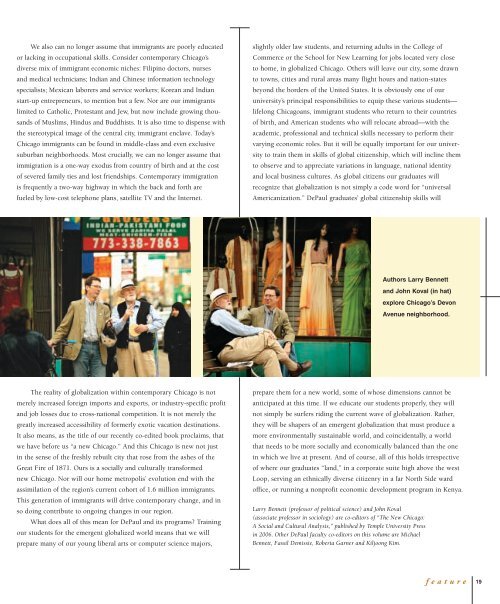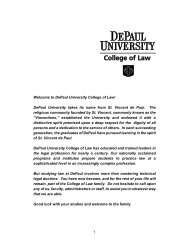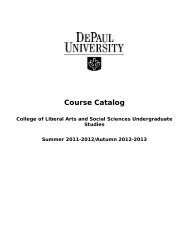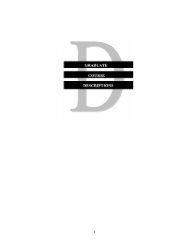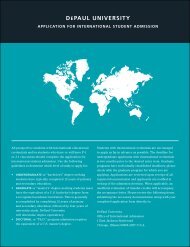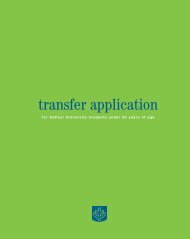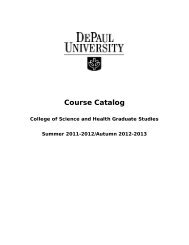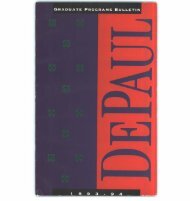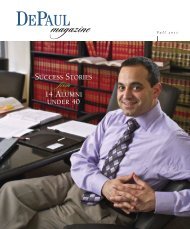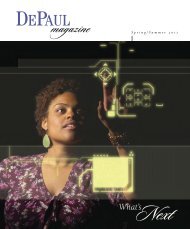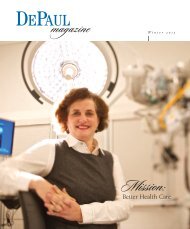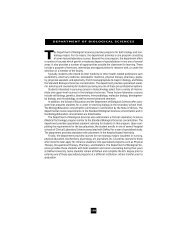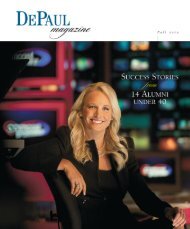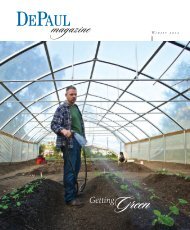Create successful ePaper yourself
Turn your PDF publications into a flip-book with our unique Google optimized e-Paper software.
We also can no longer assume that immigrants are poorly educated<br />
or lacking in occupational skills. Consider contemporary Chicago’s<br />
diverse mix of immigrant economic niches: Filipino doctors, nurses<br />
and medical technicians; Indian and Chinese information technology<br />
specialists; Mexican laborers and service workers; Korean and Indian<br />
start-up entrepreneurs, to mention but a few. Nor are our immigrants<br />
limited to Catholic, Protestant and Jew, but now include growing thousands<br />
of Muslims, Hindus and Buddhists. It is also time to dispense with<br />
the stereotypical image of the central city, immigrant enclave. Today’s<br />
Chicago immigrants can be found in middle-class and even exclusive<br />
suburban neighborhoods. Most crucially, we can no longer assume that<br />
immigration is a one-way exodus from country of birth and at the cost<br />
of severed family ties and lost friendships. Contemporary immigration<br />
is frequently a two-way highway in which the back and forth are<br />
fueled by low-cost telephone plans, satellite TV and the Internet.<br />
slightly older law students, and returning adults in the College of<br />
Commerce or the School for New Learning for jobs located very close<br />
to home, in globalized Chicago. Others will leave our city, some drawn<br />
to towns, cities and rural areas many flight hours and nation-states<br />
beyond the borders of the United States. It is obviously one of our<br />
university’s principal responsibilities to equip these various students—<br />
lifelong Chicagoans, immigrant students who return to their countries<br />
of birth, and American students who will relocate abroad—with the<br />
academic, professional and technical skills necessary to perform their<br />
varying economic roles. But it will be equally important for our university<br />
to train them in skills of global citizenship, which will incline them<br />
to observe and to appreciate variations in language, national identity<br />
and local business cultures. As global citizens our graduates will<br />
recognize that globalization is not simply a code word for “universal<br />
Americanization.” <strong>DePaul</strong> graduates’ global citizenship skills will<br />
Authors Larry Bennett<br />
and John Koval (in hat)<br />
explore Chicago’s Devon<br />
Avenue neighborhood.<br />
The reality of globalization within contemporary Chicago is not<br />
merely increased foreign imports and exports, or industry-specific profit<br />
and job losses due to cross-national competition. It is not merely the<br />
greatly increased accessibility of formerly exotic vacation destinations.<br />
It also means, as the title of our recently co-edited book proclaims, that<br />
we have before us “a new Chicago.” And this Chicago is new not just<br />
in the sense of the freshly rebuilt city that rose from the ashes of the<br />
Great Fire of 1871. Ours is a socially and culturally transformed<br />
new Chicago. Nor will our home metropolis’ evolution end with the<br />
assimilation of the region’s current cohort of 1.6 million immigrants.<br />
This generation of immigrants will drive contemporary change, and in<br />
so doing contribute to ongoing changes in our region.<br />
What does all of this mean for <strong>DePaul</strong> and its programs? Training<br />
our students for the emergent globalized world means that we will<br />
prepare many of our young liberal arts or computer science majors,<br />
prepare them for a new world, some of whose dimensions cannot be<br />
anticipated at this time. If we educate our students properly, they will<br />
not simply be surfers riding the current wave of globalization. Rather,<br />
they will be shapers of an emergent globalization that must produce a<br />
more environmentally sustainable world, and coincidentally, a world<br />
that needs to be more socially and economically balanced than the one<br />
in which we live at present. And of course, all of this holds irrespective<br />
of where our graduates “land,” in a corporate suite high above the west<br />
Loop, serving an ethnically diverse citizenry in a far North Side ward<br />
office, or running a nonprofit economic development program in Kenya.<br />
Larry Bennett (professor of political science) and John Koval<br />
(associate professor in sociology) are co-editors of “The New Chicago:<br />
A Social and Cultural Analysis,” published by Temple <strong>University</strong> Press<br />
in 2006. Other <strong>DePaul</strong> faculty co-editors on this volume are Michael<br />
Bennett, Fassil Demissie, Roberta Garner and Kiljoong Kim.<br />
f e a t u r e<br />
19


